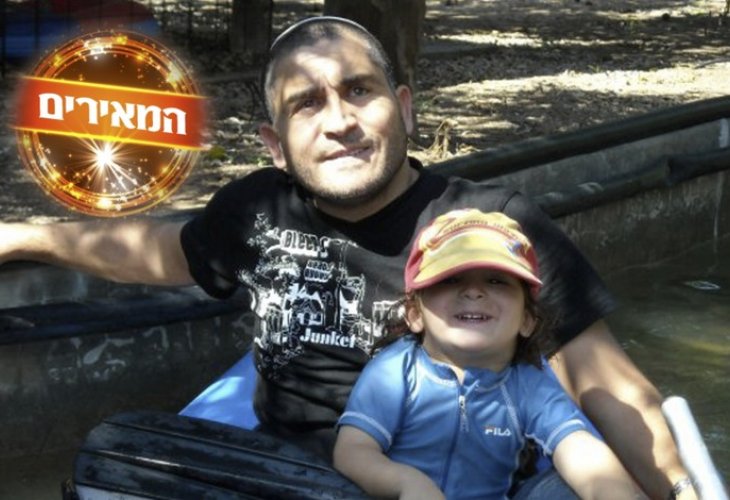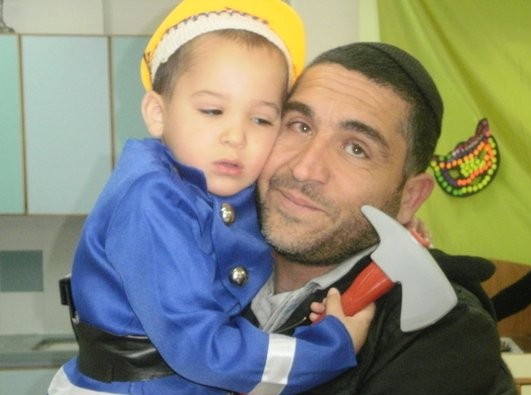Inspiring: Born with a Disability, Lost His Eye at Three - Yet His Joy and Hope Remain Unbreakable
"I always look at the half-full glass of life, and I think when you project that outward - no one truly sees you as disabled. When you don't see yourself as a person with a problem, others won't see you that way either": In honor of Chanukah, embrace the inspiring and uplifting story of Meir Weitzman

It happened 44 years ago.
When Meir Weitzman was only three years old, he was attacked in the eye while at kindergarten. He doesn't remember much from that situation, and in fact - to this day he has no idea who the attacker was, or whether it was a blow or an object that entered his eye and caused him to lose it forever. "All I remember are lights and the beeps of machines at the hospital," recalls 47-year-old Weitzman, married and a father of three from Ma'alot.
Until then, Weitzman grew up as a healthy child in every respect, except for a slight limp in his legs - with which he was born. But neither the limp in the legs nor the eye he lost and the prosthesis that took its place could take away his zest for life or the strong belief that no matter what happens in your life and what you have to deal with - you have no privilege to despair and lose hope.
When I asked how he dealt with the difficult situation as a child, Weitzman replied that despite the harassment and insults that were his lot and accompanied him in every framework he was in, in the end, it was what strengthened him. "Because my coping started at a young age, when I grew up, it was much easier for me to live life, and I no longer regarded my problems as disabilities. What doesn't kill you makes you stronger, and that's exactly what happened in my case. From a young age, I grew stronger and more resilient. It was like a preview for life itself."
Who did you turn to when it was hard? Who was there to comfort you and say that everything will be okay in the end?
"I was born to elderly parents who immigrated from Morocco when money was scarce, and they did not really know what psychologists were or where to get help. Because they dealt with my problem on their own - I felt like I didn't have anyone to tell it to, and that I had to deal with it alone. Even though coping was not simple, I didn’t feel the need to come and talk about it. I knew what had happened to me, and I also knew that I had to live and deal with it."
"Only today, as a father myself - I realize the pain my parents experienced"
But even the fact that he was born to struggling parents - a sick mother and a father who worked hard to support his family, could not distance him from the true essence of his name - Meir. And as his name suggests, out of the difficulty and coping, Meir grew up to be a person who brings light to his surroundings, strengthened by his faith, and never feels that he has the privilege to despair. Not in thought, and certainly not in speech or deed.
Weren't there moments of collapse, when you asked yourself 'Why me?'?
"There were downfalls, and sometimes I had the feeling of why me - but from a slightly different angle. It pained me that on a clear day a small child loses an eye like that without anyone giving explanations for it, and without anyone offering my parents help and tools to cope. I mainly hurt for them, for their fear and perhaps not knowing how to open my story to the authorities and get answers for what really happened there."

He seemingly had all the reasons in the world to fall into despair or lack of faith in himself or the goodness of the world - but in hindsight, Weitzman succeeds in discovering and illuminating what is good about his story. "One of the most difficult issues faced by those who have lost an eye is the inability to perceive the depth of things," Weitzman explains. "If my case had happened at an older age, I don't know how well I would have been able to overcome this issue. But because it happened at a very young age - the brain probably knew how to heal itself on its own, and today when I see a step for example - I don't see it as a flat image, but I recognize its depth and that's a tremendous advantage for me."
Anyone who talks to him and hears the positive words flowing from him easily and without any effort - understands that not only does he succeed in recognizing the depth of various external objects, but also the depth of this whole experience. "Around third grade, I reconciled with my situation and treated myself as a completely normal child. I thought more about my parents and prayed that they would get through it safely, and that they wouldn't be hurt. Only today as a father, I realize what my parents went through and the pain they experienced."
"I feel that Hashem loves me and lifts me from every trial. He doesn’t let me be sprawled on the floor completely"
There's no doubt that when you look at Meir, you see a person who brings light not only to himself but also to others, and for this - you don't really need physical eyes. To see the good in another, it is quite possible to manage with one eye. Although the second eye does not see in our terms, it still manages to see in a different dimension - much higher and spiritual. The dimension of inner reflection, which is what truly matters.
"I live with true love for every person, no matter who they are or what they are. I can sit with educated people at a high level and with people of humble origins - and with both transmit the same level of love and outlook. I come to everyone at eye level, not looking down on anyone. I treat each one with love and a friendly demeanor, and I think that's why people find it easy to connect with me. You are the mirror of society, and how you come to it - that's what you get from it."
When asked what the main message he wishes to convey through this article, Weitzman emphasizes that "everyone experiences downfalls and trials, and they cannot be prevented - but you must know how to get up from them, straighten up, and strengthen yourself. You receive the 'boom' not to sink into self-pity or a negative view of what you lack or what was done to you, but to see where you were and how you have progressed beautifully upwards. My mother, may she rest in peace, was a very sick woman from a relatively young age, and I never saw her sad. She was always happy with her situation, smiling and singing. From her, I absorbed a lot of strength in this regard, and to this day her personal example accompanies me. Five years ago, I underwent surgery on my healthy eye, and for two weeks I was completely blind. I saw nothing, but even there - I truly saw miracles.
"I feel that Hashem loves me and strengthens me, and no matter what the downfall - He never lets me be sprawled on the floor. Always lifts me with new strength. Whenever I want to get a little discouraged, I think of some geriatric department and say to myself: 'You are still far from there, right? Your situation is better than theirs, right? So calm down. What do you have to complain about?'. I always look at the half-full glass of life, and I think when you project that outward - no one really sees you as disabled. When you don't see yourself as a person with a problem, others won't see you that way either. What you 'sell' them, that's what they will 'buy'."
In honor of the month of Kislev, Hidabroot is collecting stories of light and glory about people who illuminate the path. Do you know such people? You are invited to send their details to the emaildebi@htv.co.il, or write about them yourself. Let's spread the great light together!

